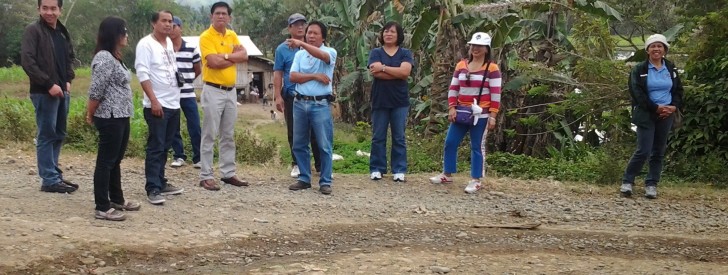 Provincial Agriculturist Domingo Bakilan (center in blue shirt) leads the validation team to the farm-to-market road proposed for repair under the PRDP.
Provincial Agriculturist Domingo Bakilan (center in blue shirt) leads the validation team to the farm-to-market road proposed for repair under the PRDP. Joint Validation of Proposed PRDP Sub-Project Conducted in Tanudan, Kalinga
By: Mabel B. Zabala
Tanudan, Kalinga Feb. 20 – Following a meeting on project updates concerning the Philippine Rural Development Program (PRDP) with Local Chief Executives of the province of Kalinga, a team composed of key officials from the National and Regional Program Coordinating Offices (NPCO and RPCO), Program Support Office (PSO), accompanied by those from the Provincial Program Management and Implementing Units (PPMIUs), proceeded to the municipality of Tanudan to conduct a joint validation of a proposed farm-to-market road (FMR) rehabilitation project here.
According to Engr. Danilo P. Daguio, Assistant Regional Director and PRDP Focal Person for CAR, this is to be the very first sub-project proposal to kick off this year once approved by the World Bank to be implemented under the PRDP.
The joint validation is one among a series of processes prior to full implementation of PRDP projects. After identifying Robusta coffee as the priority crop in Kalinga from which PRDP sub-projects are to be based, the conduct of baseline surveys and value chain analysis, among other steps led to the formulation of a feasibility study to improve the said FMR in Tanudan.
With an estimated cost to reach around P110 million, the sub-project aims to improve the 12.84 kilometer road directly influencing Barangays Dupligan, Lay-asan, Mabaca and Pangol, all located in Tanudan, specifically to address the constraint of poor accessibility to existing potential coffee production areas in the largest coffee producing municipality in Kalinga, considering also that Kalinga is ranked 7th largest coffee producer in the country. The proposed sub-project is set to benefit an initial of 3,621 households, which shall increase over time.
The PRDP, which shall be implemented for six years with a Php 27.54 Billion national budget, support such projects that aims to uplift the socio-economic conditions of farmers affected within the project area by the integration of market-oriented and climate residency agriculture support, technologies, tools and systems through its various components, and based on the commodity prioritized.
